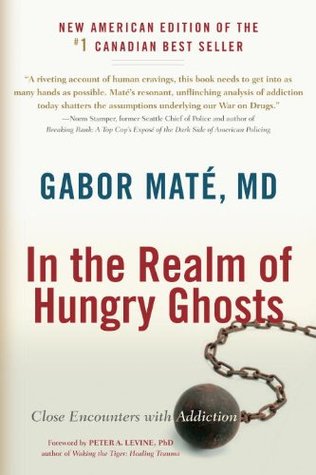More on this book
Community
Kindle Notes & Highlights
by
Gabor Maté
Read between
October 30 - November 10, 2023
This urge to escape exacts a fearful price.
But how to soothe souls inflamed by the intense torment imposed first by childhood experiences almost too sordid to believe and then, with mechanical repetition, by the sufferers themselves?
Passion is divine fire: it enlivens and makes holy; it gives light and yields inspiration. Passion is generous because it’s not ego-driven; addiction is self-centered. Passion gives and enriches; addiction is a thief. Passion is a source of truth and enlightenment; addictive behaviors lead you into darkness.
And this creates addiction’s central dilemma: if recovery is to occur, the brain, the impaired organ of decision making, needs to initiate its own healing process. An altered and dysfunctional brain must decide that it wants to overcome its own dysfunction: to revert to normal—or, perhaps, become normal for the very first time.
The three environmental conditions absolutely essential to optimal human brain development are nutrition, physical security, and consistent emotional nurturing.
Functional differentiation refers to a person’s ability to function based on external factors. The less basic differentiation a person has attained, the more prone he is to rely on relationships to maintain his emotional balance.
Self-esteem is not what the individual consciously thinks about himself; it’s the quality of self-respect manifested in his emotional life and behaviors.
With the rise of industrial societies came dislocation: the destruction of traditional relationships, extended family, clan, tribe, and village. Vast economic and social changes tore asunder the ties that formerly connected people to those closest to them and to their communities. They displaced people from their homes and shredded the value systems that secured people’s sense of belonging in the moral and spiritual universe.
“Choice,” Eckhart Tolle points out, “implies consciousness—a high degree of consciousness. Without it, you have no choice.”3
“Action has meaning only in relationship,” said the spiritual teacher Jiddu Krishnamurti, “and without understanding relationship, action on any level will only breed conflict. The understanding of relationship is infinitely more important than the search for any plan of action.”
Denying addicts humane assistance multiplies their miseries without bringing them one inch closer to recovery.
Step One: Relabel In step one you label the addictive thought or urge exactly for what it is, not mistaking it for reality.
Step Two: Reattribute “In Re-attribute you learn to place the blame squarely on your brain. This is my brain sending me a false message.”4 This step is designed to assign the relabeled addictive urge to its proper source. In step one you recognized that the compulsion to engage in the addictive behavior does not express a real need or anything that “must” happen; it’s only a belief. In step two you state very clearly where that urge originated: in neurological circuits that were programmed into your brain long ago, when you were a child. It represents a dopamine or endorphin “hunger” on the
...more
Step Three: Refocus In the refocus step you buy yourself time. Although the compulsion to open the bag of cookies or turn on the TV or drive to the store or the casino is powerful, its shelf life is not permanent.
Step Four: Revalue This step should really be called devalue. Its purpose is to help you drive into your own thick skull just what has been the real impact of the addictive urge in your life: disaster. You know this already, and that is why you are engaged in these four steps. It’s because of the negative impact that you’ve taken yourself by the scruff of the neck and delayed acting on the impulse while you’ve relabeled and reattributed it and while you have refocused on some healthier activity. In this revalue step you will remind yourself why you’ve gone to all this trouble. The more clearly
...more
Step Five: Re-create Life, until now, has created you. You’ve been acting according to ingrained mechanisms wired into your brain before you had a choice in the matter, and it’s out of those automatic mechanisms that you’ve created the life you now have. It is time to re-create: to choose a different life.
In choosing sobriety we’re not so much avoiding something harmful as envisioning ourselves living the life we value. What sobriety looks like will vary from person to person, but in all cases it has the individual, rather than the addictive compulsion, in the lead.


